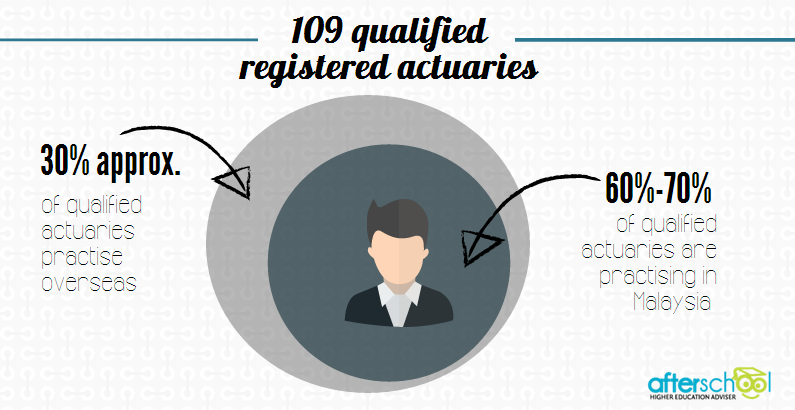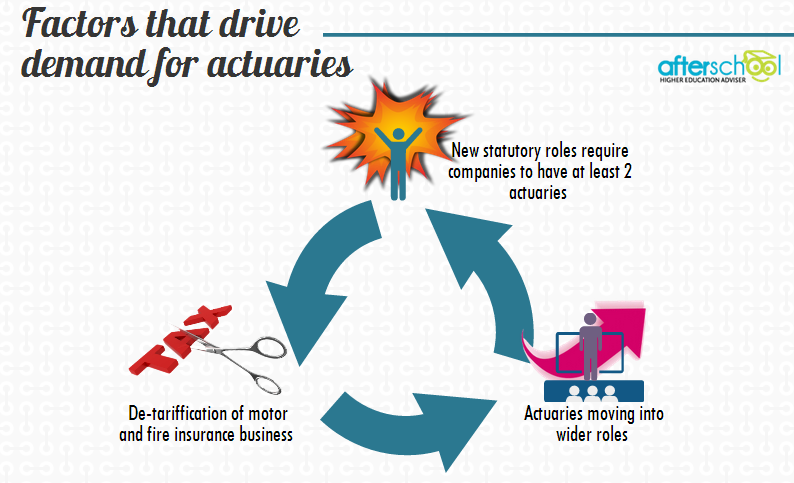Demand for more qualified actuaries in Malaysia on the rise

Afterschool Team
August 13, 2014
Actuary is a top-rated job. Once limited to the insurance industry, this profession is now in demand in all different industries. However, there aren't enough actuaries to fill the growing demand among a wide range of employers.
 With only 109 qualified actuaries in Malaysia, the market for actuaries can still be considered unsaturated.[/caption]
With only 109 qualified actuaries in Malaysia, the market for actuaries can still be considered unsaturated.[/caption]
There are about 109 qualified actuaries registered as fellow of the Actuarial Society of Malaysia, the only representative body for the actuarial profession in Malaysia. According to Mr. Wan Saifulrizal Wan Ismail, president-elect of the Actuarial Society of Malaysia, the numbers have been growing, and for the past 3 to 4 years, about 10 actuaries become fellows each year. However, he noted that only about 60 to 70 per cent of these qualified actuaries are practising in Malaysia. With that said, companies are finding it difficult to retain experience hires as generally they tend to be mobile, not only within Malaysia but also other countries in the region. According to a report, demand for actuaries is strong in Australia, Singapore and Hong Kong, and with local talent pools easily depleted, actuaries are moving between these markets and relocating from outside the region.
"There is definitely a shortage of actuaries, not only for qualified actuaries but also for those with industry experience but have yet to qualify. It will take a couple of years before those graduate recruits gain sufficient market experience to fill-up the middle management roles."
He added that there is strong competition for fresh graduate positions as Actuarial Science course is now a popular course.
Factors that drive recruitment
Local demand for the services of Malaysian-based actuaries is on the rise thanks to these major changes:
- Changing statutory role of actuaries
Bank Negara Malaysia (BNM), the regulator of the insurance and takaful industry, has released a new guideline on the role of the Appointed Actuaries, which amongst others spells out the need for each company to have its own internal Appointed Actuary (AA) and also to exclude the pricing function of insurance/takaful products from the AA role. If this is interpreted strictly, it can be assumed that each company needs to have at least 2 actuaries (i.e. one for the AA role and one for pricing), given that there are about 50 companies in the industry, about 100 actuaries are needed to fulfil the statutory roles.
- Potential de-tariffication of motor and fire insurance business
Currently, the motor and fire insurance coverage are tariff rated, which means that premium rates are standardized across all companies. However, the regulator has indicated that in 2016 the rates will be de-tariffed and hence, companies can vary prices based on the riskiness of the risks being covered as well as their own strategy. Given that companies now need to set their own prices, and based on observations from market where prices are liberalized, there will be an increase demand in actuarial resources to help company prepare and operate under a de-tariffed environment.
- Actuaries moving into wider roles
Actuarial science is one of the very rare degree or professional courses which focuses on insurance. Hence, typically, those with actuarial background have a good grasp of various aspects of insurance business. Therefore, it is no surprise that actuaries tend not to only operate within the traditional actuarial roles but other management roles within an insurance company. According to Ismail, they have seen senior actuaries moving into leadership positions such as CEO, CFO of companies previously. But more recently, due to the emphasis by the regulator on risk management, they have seen quite a number of senior actuaries that have also made the transition into the Chief Risk Officer of companies
How much do actuaries make?
When it comes to benefits, Ismail said that qualified actuaries have higher salaries than most of other professionals in the financial services industry. According to Jobstreet.com, new graduates majoring in actuarial science earn a basic of RM2,475 per month.
Those with 5 and 10 years' experience get an average annual salary of RM76,000 and RM120,000, respectively. Some actuaries, especially consulting actuaries may travel more often to meet their clients. On average, actuaries clock in at least 40 hours per week.
In most cases, companies who need actuaries get the services of head hunters or recruiting firms that specialize in actuarial recruiting. According to a headhunter who asked not to be named, Deloitte, Ernst & Young and KPMG are the top recruiters in Asia. The Big Four are hiring actuaries to work on specialised products, strategy and advice, and in areas where insurers require a third party from a regulatory perspective.
Other leading recruiters are AIA, HSBC, Manulife, SunGard, Ageas, MetLife and Prudential.
Most actuaries are employed in the insurance industry, specializing in either life and health insurance or property and casualty insurance. However, the insurance industry is not the only sanctuary for actuaries. Apparently, actuaries can also be found working in businesses, financial institutions such as banks, government and public sectors, as well as in academia.




